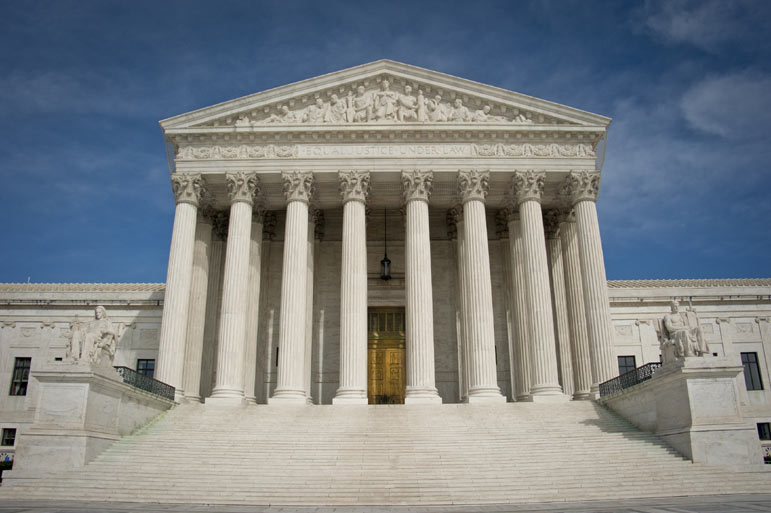
The Washington Redskins are headed for the Supreme Court - in the guise of a dance rock band called the Slants. The Department of Justice has asked the court to review a lower court's holding that the Patent and Trademark Office violated the band's free-speech rights by denying it a registered trademark on the grounds of offensiveness.
The justices are likely to take the case - which would mean that next year they will effectively decide whether the patent office was right to cancel the National Football League franchise's trademark registration. It also means that the question of what to do about names that offend some listeners is going to get its day in court.
The Justice Department intervened in a case last year to defend the government's right to cancel the Redskins' trademark registration, but that matter hasn't made its way to the Supreme Court yet. That's one reason there will be significant attention paid to the parallel case of the Slants, decided by the U.S. Court of Appeals for the Federal Circuit under the case name In re Simon Shiao Tam.
Tam is the founder of the Slants, an all-Asian American band that took its name with the intention of subverting the racial slur. The patent office refused to register the band's name as a trademark because of a federal law, section 2(a) of the Lanham Act, which says that the office need not register a trademark that "consists of or comprises immoral, deceptive, or scandalous matter which may disparage … institutions, beliefs, or national symbols, or bring them into contempt, or disrepute."
For 70 years, the patent office has regularly refused to register trademarks that it considers offensive. The appeals court's opinion features some names that the office has rejected, including "Stop the Islamisation of America"; "Christian Prostitute"; "Mormon Whiskey"; "Heeb" and some much cruder ones.
Most of that time, no one questioned that the statute was constitutional. When the government denies trademark registration, it isn't prohibiting anybody from using a name or phrase. It doesn't even prevent patent infringement lawsuits.
The function of registering a trademark is somewhat technical. When a trademark has been registered under the Lanham Act, its owner is allowed to use the ® symbol and receives a presumption of trademark ownership and certain protections against the importation of counterfeit goods.
The First Amendment says Congress can't make a law abridging freedom of speech. Under traditional free-speech doctrine, where there's no abridgment, there's no violation. The Justice Department, backing the patent office, says that there's no First Amendment violation in turning down offensive trademarks because no speech is being limited. All that's happening is that a privilege is being withheld.
But free-speech protection has been expanding for 20 years. One important factor of that expansion is a doctrine known as "prohibited viewpoint discrimination" that was favored by the late Justice Antonin Scalia.
The idea is that the government may not pick and choose between different types of private speech on the basis of the viewpoint expressed. In theory, the government could still do so if it had a compelling reason and used the least restrictive means possible. In reality, that standard is almost never met. If the court finds that the government has discriminated on the basis of viewpoint, it almost invariably strikes down the law.
You can see why viewpoint discrimination doctrine poses a problem for the denial of trademark protection. As the appeals court said, "When the government refuses to register a mark under sec. 2(a), it does so because it disapproves of the message a speaker conveys by the mark." That's the definition of prohibited viewpoint discrimination.
The appeals court said that denying registered-trademark status had the effect of chilling speech even if it didn't ban it completely. The whole point of denying offensive marks, it said, is to discourage people from using them.
Although it's too soon to be certain, I don't think this case will end with a 4-4 split among the Supreme Court justices, even if the final seat on the court isn't filled in time to consider the case. Viewpoint discrimination has become a basic element of the court's free speech jurisprudence. And it will be difficult to convince five justices that refusing a government benefit doesn't count as abridging speech.
The court's ultimate decision probably won't expressly address the question of whether names like "Redskins" are morally acceptable. But the effect will probably be to make that question one of policy, not of law.
The authors of the Lanham Act didn't anticipate that they would be violating the First Amendment when they passed it in 1946. But the Constitution is alive -- and despite his claim that the Constitution shouldn't evolve, Scalia contributed to its evolution. He'd have been happy to see the case coming to the court. We can be pretty sure how he'd have cast his vote.
Comment by clicking here.
Noah Feldman, a Bloomberg View columnist, is a professor of constitutional and international law at Harvard University and the author of six books, most recently "Cool War: The Future of Global Competition."


 Contact The Editor
Contact The Editor
 Articles By This Author
Articles By This Author
